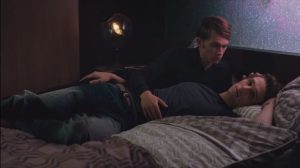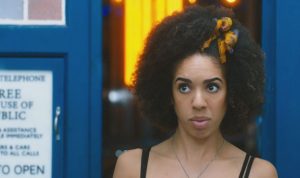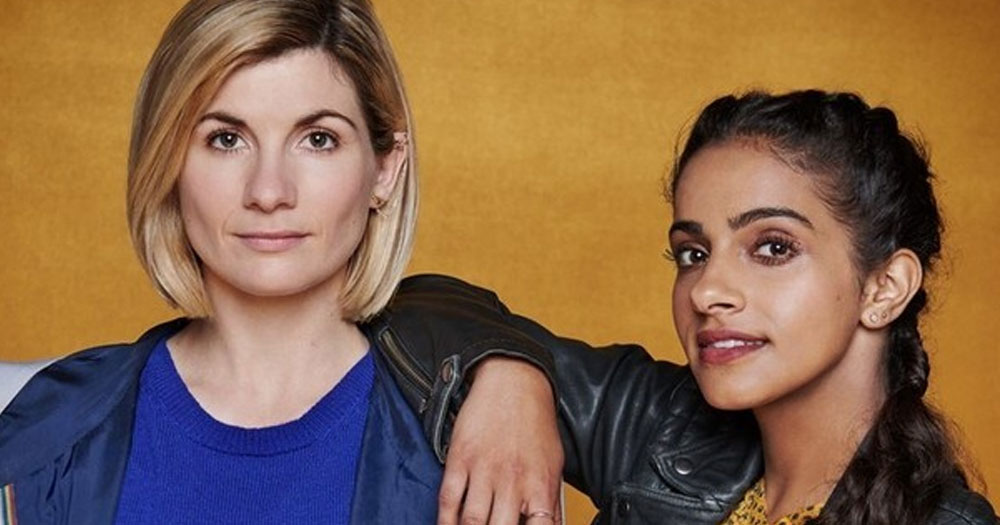Pop culture guru David Ferguson is back with a look at the queer history of that BBC sci-fi TV staple – Doctor Who.
In the recent Doctor Who New Year’s special, Eve Of The Daleks, it was revealed that female companion Yasmin Khan (Mandip Gil) has romantic feelings for Jodie Whitaker’s Thirteenth Doctor. This was a bit of a revelation as it hadn’t been really been hinted at before, with viewers seeing her feelings as more of a friendship. Although looking back at the previous season again, the feelings can be seen as romantic.
Anyway, the reveal of a new queer character in Doctor Who got me thinking about previous representation as well as the contribution of queer people both behind the scenes and on camera. (Note: there are books, comics and audio plays too but let’s stick to TV for brevity’s sake!)
You may be surprised to know that these contributions started at the very beginning. The director of the first serial The Unearthly Child (1963), Waris Hussein, is gay. I only became aware of this fact while watching a dramatisation of the William Hartnell era, An Adventure In Space And Time (2013). Hussein would go on to direct most of the fourth serial Marco Polo (1964).
The earliest openly gay creator who had a big influence on the show was John Nathan-Turner who was the producer from Season 18 of the original series until that series was cancelled – a period of ten years. In The John Nathan-Turner Memoirs: Volume 2, he revealed that he received backlash from British tabloids for his habit of hiring openly gay actors. This included Matthew Waterhouse who played Doctor Who companion, Adric.

Though there were no openly gay characters during this time, we did get some interesting scenes from the Fifth Doctor’s (Peter Davidson) companion Turlough (Mark Strickson). Strickson later commented that, not knowing what to do with him, the writers would often have the villains capture or lock him up, leading to Turlough ending up in various “states of bondage”.
In the BBC Wales era, the biggest influence has obviously been Russell T Davies. Davies had been working for years to get the BBC to bring the show back. His era added the first non-heterosexual companion, the pansexual Captain Jack Harkness (played by queer actor John Barrowman). Harkness’ sexuality was further explored in the more adult spin-off Torchwood. One of that series’ focus was his relationship with Ianto Jones (Gareth David-Lloyd).
The second series saw a subplot featuring his old male lover, John Hart (James Marsters). Another spin-off, The Sarah Jane Adventures, a show aimed at a younger audience, was to have introduced a gay character but the show ended before it could happen. Sadly this was due to the death of Elisabeth Sladen who played Sarah Jane.

After becoming showrunner, Steven Moffatt introduced a number of gay characters. Most notable in the Eleventh Doctor (Matt Smith) era were Victorian-era lesbian married couple Madame Vastra (Neve Macintosh) and Jenny Flint (Catrin Stewart). In 2016, another spin-off, Class, featured a gay romance between central characters Charlie Smith (Greg Austin) and Matteusz Andrzejewski (Jordan Renzo). I particularly enjoyed this series as it portrayed their teenage romance in a believable way. It lasted only one series but was continued in audio form.
The Twelfth Doctor (Peter Capaldi) era saw the debut of the first openly gay full-time companion, Bill Potts (a personal favourite) played by bisexual actress Pearl Mackie. Her sexuality was fully established in her debut episode, The Pilot (2017). The Moffatt and Chris Chibnall (the current showrunner) eras also saw a variety of queer supporting characters.
As for the future, we have two specials to come featuring Jodi Whitaker so we will see what happens with the relationship that inspired this piece. Chris Chibnall’s replacement as showrunner? The returning Russell T. Davies.
Who is putting money on Ollie Alexander as the first queer actor to play The Doctor?
You can check out more of David Ferguson’s pop culture musings here.
© 2022 GCN (Gay Community News). All rights reserved.
Support GCN
GCN is a free, vital resource for Ireland’s LGBTQ+ community since 1988.
GCN is a trading name of National LGBT Federation CLG, a registered charity - Charity Number: 20034580.
GCN relies on the generous support of the community and allies to sustain the crucial work that we do. Producing GCN is costly, and, in an industry which has been hugely impacted by rising costs, we need your support to help sustain and grow this vital resource.
Supporting GCN for as little as €1.99 per month will help us continue our work as Ireland’s free, independent LGBTQ+ media.
